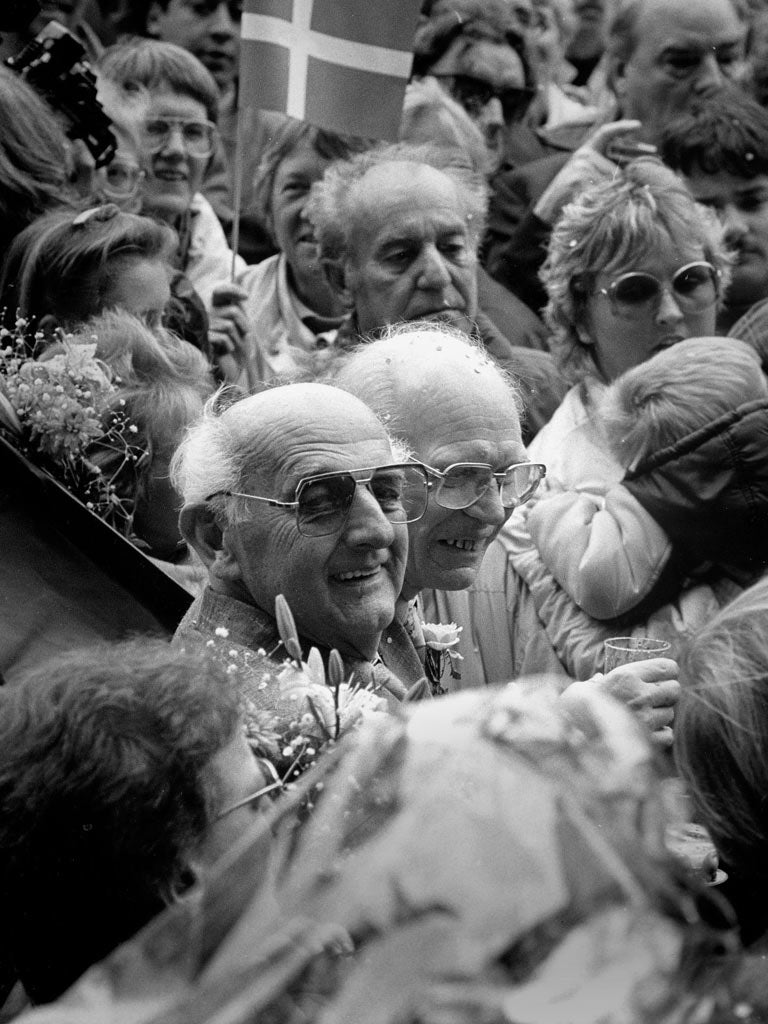Axel Axgil: Gay activist who pioneered civil partnerships

Your support helps us to tell the story
From reproductive rights to climate change to Big Tech, The Independent is on the ground when the story is developing. Whether it's investigating the financials of Elon Musk's pro-Trump PAC or producing our latest documentary, 'The A Word', which shines a light on the American women fighting for reproductive rights, we know how important it is to parse out the facts from the messaging.
At such a critical moment in US history, we need reporters on the ground. Your donation allows us to keep sending journalists to speak to both sides of the story.
The Independent is trusted by Americans across the entire political spectrum. And unlike many other quality news outlets, we choose not to lock Americans out of our reporting and analysis with paywalls. We believe quality journalism should be available to everyone, paid for by those who can afford it.
Your support makes all the difference.On 1 October 1989 Axel and Eigil Axgil became the first same-sex couple in the world to receive legal recognition and rights under a national law, Denmark's trail-blazing registered-partnership legislation. The ceremony was the result of decades of campaigning by the Axgils and their friends and colleagues. Their pioneering work led the way for other countries to introduce civil partnership arrangements, including the UK, where the first ceremonies were performed in 2005.
Axel Lundahl-Madsen was born in Braendekilde in 1915. As an openly gay young man he frequented the dance halls of nearby Odense looking for love, recalling in a recent interview that, "Most of the men came to find a girl. But I discovered that if you waited, there was always someone left behind. You introduced yourself, talked and sometimes went home with them."
Motivated by the UN Declaration of Human Rights in 1948, Axgil created and initially chaired the Kredsen af 1948 [Circle of 1948], Denmark's first gay rights organisation, which became LGBT Danmark ["LBGT": Lesbian, bisexual, gay, transgender]. The group's spokesperson, Vivi Jelstrup, said, "You have to be impressed by the colossal enthusiasm Axel Axgil has shown throughout his entire life for helping other homosexuals. Regardless of how hard they were hit themselves, he and Eigil tirelessly worked on."
Axgil met his partner, Eigil Eskildsen, at a meeting of the Kredsen group in 1949. The same year they worked together with Knud Rame to publish the first edition of Vennen [Friend], a newspaper for homosexuals whose content was considered illegal at the time despite homosexuality itself having been legal in Denmark since 1930. The couple became engaged in 1950 and chose the surname "Axgil", a portmanteau of their first names.
Life as "out", actively campaigning homosexuals remained difficult in the Denmark of the 1950s. In 1955 they were arrested and imprisoned for publishing photographs of naked men, through their agency International Modelfoto Service. The authorities charged that the photographs "although not obscene, may be deemed a commercial speculation with a sensual intent". The pair later ran a bed and breakfast in northern Denmark, catering especially for gay men and women.
The 1989 Danish legalisation of civil partnerships was the culmination of 40 years of campaigning, so it was fitting that the Axgils were the first to be recognised as legal partners. Interviewed just before the ceremony, Eigil said, "We just never could have dreamed we would get this far" and urged campaigners in other countries to "Be open. Come out. Keep fighting. This is the only way to move anything. If everyone comes out of the closet then this will happen everywhere."
From 1994 to 2000 the British human-rights campaigner Peter Tatchell worked with Hans Christian Thaysen and Axel Axgil to expose the Danish Nazi war criminal, Dr Carl Vaernet, who had been involved in hormone experiments to create a supposed "cure" for gay prisoners in Buchenwald.
"Axel was in his late 70s when he contacted me about the Vaernet case, with just a few vague, sketchy details," Tatchell recalled. "But he had a very sharp, forensic mind, and gave me some useful suggestions." In 1998 Tatchell wrote to the then Danish Prime Minister, Poul Rasmussen, demanding an end to the cover-up of Vaernet's activities. After a period of silence, then wide media coverage, the result was the disclosure of 31 war criminals, documented in 2004 in the book Værnet: den danske SS-læge i Buchenwald [The Danish SS Doctor in Buchenwald]. It emerged that Vaernet had been helped by the Danish authorities to emigrate to Argentina, where he continued his hormone research and died in 1965.
Tatchell remembers Axgil as a "modest, warm-hearted, generous, intelligent and pioneering humanitarian who deserves great admiration from all LGBT people, Danes and humanitarians," adding that, "He was a true hero and I salute him. He will live on through his extraordinary contribution to LGBT human rights. I feel very fortunate to have worked with him."
Marcus Williamson
Axel Lundahl-Madsen (Axel Axgil), gay rights activist: born Braendekilde, Denmark 3 April 1915; 1989 civil partnership with Eigil Eskildsen (died 1995); died Copenhagen 29 October 2011.
Join our commenting forum
Join thought-provoking conversations, follow other Independent readers and see their replies
Comments